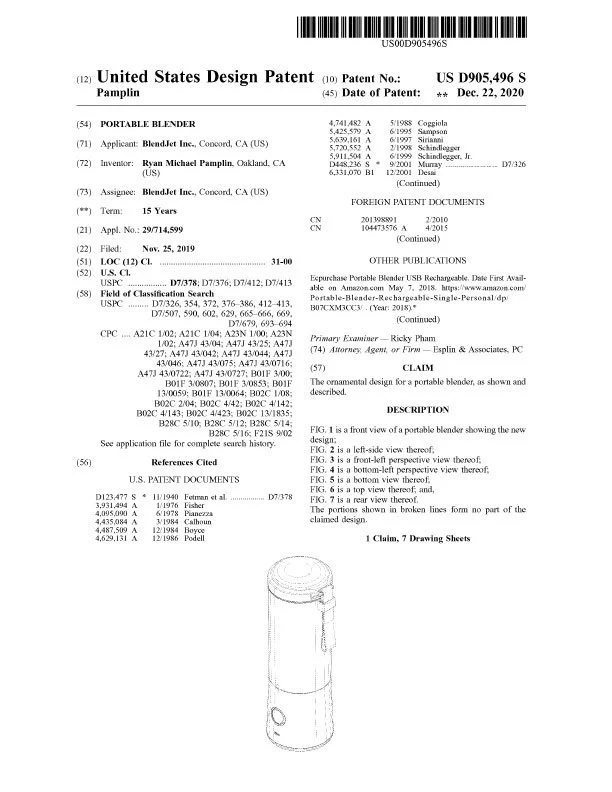Is It Worth Filing For Design Patent Protection? What Inventors Should Know
Written By Morgan Cope
If you have ever come up with a product or design and thought, “Someone must have already invented this,” or “It’s probably too expensive to protect,”—you’re not alone. Every day, individuals and business owners face the question of whether to pursue legal protection for their innovations. Design patents are one of the most accessible tools available for protecting your ideas, and they’re often overlooked.
If you're selling products on platforms like Amazon, Etsy, or eBay, you know how common it is to see copycat listings pop up—sometimes within weeks of launching a new product. This is where having a design patent can offer a real advantage.
Major online marketplaces have IP enforcement tools that allow rights holders to report and remove infringing listings. An issued design patent gives you a legal basis to take swift action against sellers who are imitating the look of your product. Without a patent (or even with a Utility Patent), it can be much harder to prove your rights or get platforms to act quickly.
In this post, we’ll break down what a design patent is, when it makes sense to file one, how to obtain protection both in the U.S. and internationally, and why protecting your design could be a smart long-term move—even if you're just starting out.
What Is a Design Patent?
A design patent protects the ornamental appearance of a product—how it looks, rather than how it works. Think of the shape of a smartphone, the design of a piece of furniture, or the unique look of that new fancy gadget. If your design is new and not obvious, it may be eligible for protection under U.S. and international law.
Unlike utility patents, which can be more complex and costly to obtain, design patents are generally quicker and less expensive to file. That makes them a good entry point for inventors and startups who are testing the waters of intellectual property protection.
“But What If Someone Already Came Up With This?”
One of the most common reasons people hesitate to file for patent protection is the fear that their idea isn’t unique enough. You may see a product on the market and think it “does the same thing” as your innovation. However, design patents cover the look, not the functionality. So, even if your product is “doing” something that has been done for ages, the unique look of your product may still be enough to obtain protection. And, even if you discover similar designs, understanding what’s already out there can help you strategically refine your product or focus on features that offer a competitive edge.
How Expensive Is It, Really?
Cost is often the biggest barrier, especially for solo inventors or small startups. The good news is that design patents are relatively affordable.
USPTO fees for small and micro entities are reduced significantly.
Legal fees are often lower than for utility patents.
You can often get protection within 12–18 months, sometimes sooner.
Costs go up if you're filing internationally or if you need enforcement support. But when weighed against the potential value of your design in the market, a design patent can be a smart investment, especially for products that rely heavily on visual appeal.
What About International Protection?
If you think your product might sell outside the U.S., or if your manufacturing happens overseas, international design protection is worth considering.
The Hague System allows you to file a single international application that can cover multiple countries. Instead of dealing with each national office separately, you can streamline the process through the World Intellectual Property Organization (WIPO). This can significantly reduce the administrative burden and cost of pursuing protection in multiple jurisdictions.
However, it's important to plan ahead: many countries require that you file before public disclosure, and within six months of a U.S. design application if you file there first. That means early strategy discussions are crucial if international markets are on your radar.
Something to consider: the Hague System provide applicants with a unique enforcement advantage that isn't typically available through a standard U.S. design patent application – provisional rights. U.S. design patents are not published before they are granted, which means applicants cannot seek damages for infringement that occurs before the patent issues. However, when a design application is filed through the Hague System, the application is published by WIPO—usually about 12 months after international registration. This publication acts as a public notice, opening the door for provisional rights if certain conditions are met.
Final Thoughts: Is It Worth It?
Here are a few reasons to consider filing:
Exclusive rights: A U.S. design patent gives you up to 15 years of protection from competitors copying your patented design.
Brand value: A protected design strengthens your product’s brand identity and makes it harder for others to piggyback on your success.
Investor confidence: Patents can make your business more attractive to investors or partners by showing you're serious about protecting your assets.
Leverage in disputes: Even a single design patent can be a powerful tool if you're ever in a legal dispute over a knockoff or imitation product.
If your product has a unique look—and especially if appearance is a big part of its value—filing a design patent is at least worth exploring. You don’t have to be a big company with a legal department to take advantage of this protection.
Every year, thousands of small businesses and individual creators successfully use design patents to build stronger brands and block imitators. With the option of international protection through the Hague System, your reach can be even broader than you might imagine.
If you’re unsure whether your design is eligible—or whether it’s worth the time and cost—consulting with our firm is a low-risk first step. The right advice early on can make all the difference.

